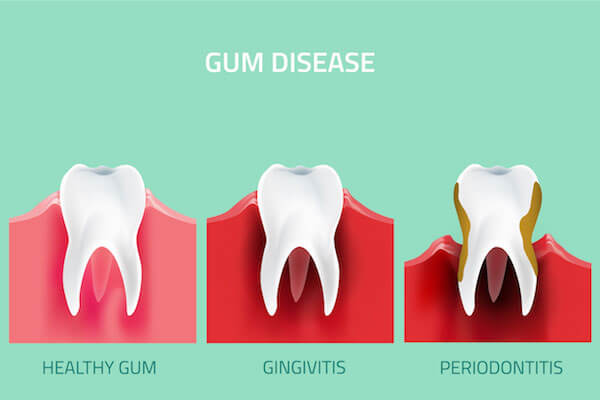
What is the Difference Between Gingivitis and Periodontitis?
When a lot of people hear about gingivitis and periodontitis, they think that these terms are interchangeable. While both of these conditions have to do with the health of your gums, they are actually quite different. When dealing with either gingivitis or periodontitis, it is important to seek treatment immediately to avoid the condition worsening. A board-certified periodontist will set up a treatment plan that will help you to rid yourself of the problem allowing you to save your teeth and the health of your mouth.
What is Gingivitis and Periodontitis?
The mild form of gum disease, gingivitis is defined as an inflammation of the gums that is caused by an excessive amount of plaque on your teeth. This is the first phase of gum disease and can be identified by red and swollen gums or if your gums bleed easily when you brush them. Many times, those who have gingivitis may not even recognize that they have it because of how mild it can be.
If your gum disease progresses without the proper treatment from a board-certified periodontist, it may worsen to become periodontitis. If this occurs with your gum disease, you may begin to notice that your gum tissue is starting to pull away from your teeth and pockets are beginning to be created that provide an area for bacteria to build up and cause further infection to your gums. Periodontitis can be identified through its symptoms which include red and swollen gums, bleeding gums, pain when chewing, poor teeth alignment, receding gums, pockets between the teeth and the gums, sores inside the mouth, and loose and sensitive teeth.
Telling the Difference Between Gingivitis and Periodontitis
There are multiple ways that you can tell whether you have gingivitis or periodontitis. Knowing the difference between these two conditions will tell you which you have and will prepare you for the treatment that will ensue.
Given that periodontitis is rare in teenagers, usually progressing to that point at a later age, a teenager who has gum disease likely has gingivitis. While it may just be gingivitis at the time, it is important to immediately have the condition treated so it does not worsen over time and become periodontitis which could result in the loss of teeth.
Gingivitis is often difficult for those with it to identify. There typically is not any pain involved when it comes to their gums and their everyday life. Conversely, periodontitis can cause pain when chewing. If you are feeling pain while chewing, it is quite possible that you had gingivitis that has progressed to periodontitis.
If you can tell you have gum disease but are not sure whether it is gingivitis or periodontitis, the condition of your teeth may be a good indication. While irritated, red, and swollen gums are signs of both diseases, the stability of your teeth may be the differentiating factor. With gingivitis, the teeth usually remain firmly in place but with periodontitis, the teeth may become loose as if they are going to fall out.
If you suffer from gum disease and seem to persistently have bad breath, this may indicate that you have advanced from gingivitis to periodontitis. While gingivitis may not have an influence on your breath, the consistent presence of excess bacteria caused by periodontitis will negatively influence your breath.
Gum disease often starts off with gingivitis, the mildest form of the disease. In fact, gingivitis can be so mild that the person suffering from it may not even notice that they have it. As the disease worsens, it can become a more advanced version of the condition, known as periodontitis. While red and swollen gums may have appeared with gingivitis, periodontitis may bring pain when chewing, sores in the mouth, and loose and sensitive teeth. If the symptoms of your condition itself is not enough for you to identify whether you have gingivitis or periodontitis, you may be able to tell the severity of the condition by your age, whether you have pain chewing, the condition of your teeth, or whether you have persistent bad breath. No matter the severity of your gum disease, it is important to seek the help of a board-certified periodontist for treatment to keep the condition from worsening. If you have gingivitis or periodontitis, come to Vero Implants and Periodontics for the right treatment.